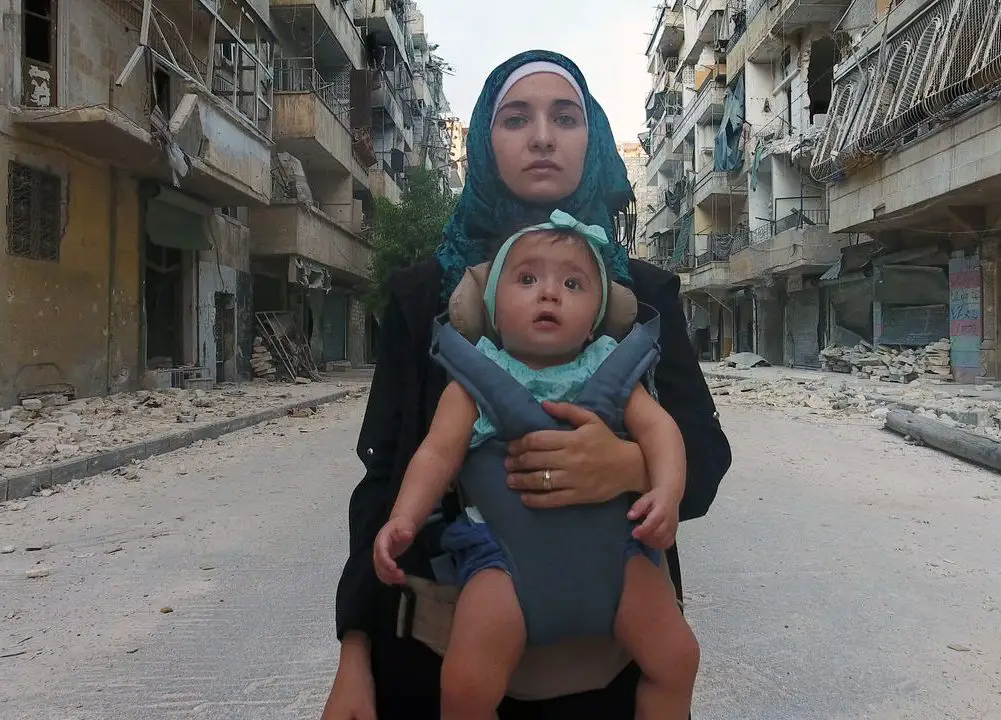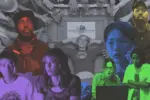“Where’s my girl?! Who’s got my girl?!” Waad al-Kateab cries as smoke fills the hallways of a makeshift hospital. Each crash of the overhead bombs drives home a terrifying reality: She is trapped under a Russian airstrike. What’s worse, she cannot find her daughter, Sama. The young mother carries a camera in hand, and its motions mimic her frenzied state of mind. Footage bobs up and down as she sprints through dark corridors, allowing viewers to share this woman’s bleak perspective. In moments like these, “For Sama” distinguishes itself from the common documentary. This digital narrative simply consists of the vlog-style accounts from an eyewitness living in the midst of war.
In 2011, al-Kateab was a normal college student attending classes at the University of Aleppo in Syria. Her parents, perceiving their daughter as headstrong and reckless, warned the girl to tread lightly as she stepped away from the safety of home. Undaunted by this advice, the young student soon established herself as the documentarian of a revolution.
With a population of 4.6 million prior to its ghastly siege, Aleppo stood as a strategic landmark for all parties in the Syrian Civil War. Students, recognizing their city’s importance, engaged in a protest against President Bashar al-Assad on April 29, 2012. Gripping her camera, al- Kateab walks the dusty roads outside the university, filming the activists’ demonstrations and soldiers’ retaliation. Of course, the situation only escalates from this point forward. As the conflict grows bloodier, al-Kateab joins a team of doctors and nurses caring for injured rebels in the heart of the city. Here, in an effort to cope with the ongoing nightmare, she records the heartbreaking casualties of war.
In its devotion to truth, “For Sama” refuses to sterilize suffering for viewers. The fledgling journalist films victims of Assad’s brutality, showing the tortured bodies his soldiers display in the streets to discourage rebellion. Later, the hospital begins to treat hundreds of wounded civilians each day, with al-Kateab filming to present the carnage to the outside world. The patients, often malnourished and dehydrated, confront the bombings with an already sickly disposition. Their obstacles, however, could never outweigh the difficulties faced by the youngest victims.
Children, and the injuries they sustain, repeatedly surface in al-Kateab’s narrative. A boy carries his brother to the ready arms of the doctors, only to find that it is too late to save him. Babies wail for food in the final days of the siege, unable to understand the hunger gnawing at their bellies. The graphic reality of war stains every frame of al-Kateab’s film, leaving nothing up to an audience’s imagination.
Despite the suffering, “For Sama” also illustrates the profound durability of the human spirit. As al-Kateab films, children walking past playfully shoot peace signs at the camera, smiling as if the buildings around them were not crumbling. Local mothers still hold classes for the neighborhood, teaching as if their future were guaranteed. Through a series of flashbacks, the camerawoman shows how she fell in love with Hamza, a doctor laboring night and day at the hospital. The couple chooses to marry, allowing the sounds of their celebration to drown out the bombs outside. Soon, they welcome their first daughter into the world, offering her its suffering and beauty alike.
With this choice, the narrative introduces a poignant question, illustrating its devotion to nuance. Throughout “For Sama,” al-Kateab grapples with her decision to bring a baby into such a chaotic situation. After Sama flings her bottle away, a friend teasingly speculates on the infant’s inner thoughts: “She’s saying, ‘Mum, why did you give birth to me? It’s been nothing but war since the day I was born.’” Although playful, the interaction resonates with the baby’s mother.
She feels guilty, wondering if the circumstances surrounding Sama’s birth will eliminate any chance for a happy childhood. On the other hand, giving up a potential family seems like a rejection of the ideal she so desperately believes in: freedom.
In the face of this question, the couple chooses to pursue a life of absolute liberty, having a baby as if the regime could topple the next day. Although initially confident, al-Kateab experiences intense doubt as she watches both the surrounding conflict and her pregnant belly swell. In her introduction to the footage, the young mother sends a message to her daughter. “Sama,” she murmurs, “I’ve made this film for you. I need you to understand why your father and I made the choices we did.” With this declaration, viewers can see that the following documentary is actually a love letter, written from mother to daughter with intense care.
As the letter unfolds, audiences will become immersed in al-Kateab’s stunning cinematography. The camera remains level with her line of sight, placing viewers in the woman’s mind as she marches in the streets and bends down to care for a bleeding child. Although subtle, framing the narrative in this manner distinguishes the documentary from other members of the genre. While its war-focused peers document battle strategies, “For Sama” chronicles human concerns like suffering, grief and hope in spite of tragedy. These themes, although historically less popular, lend al-Kateab’s exposition a timeless appeal.
In the end, “For Sama” emerges as a stunning account of dissent, suffering and the souls who endured it all for the sake of freedom. Its poetic narration and skillful cinematography ensure audiences process the emotional duress that accompanies war, not just the dry facts and battle strategies. As al-Kateab films incomparable evil, she also inserts nods to life’s capacity for joy, tracing the indomitable human spirit through the throes of war. Her final portrait is beautiful, harrowing and complex, just like the situations she faced during this time. One decision, however, remains black and white in her mind. In the documentary’s final moments, al-Kateab reveals that, “Even if I never recover from the trauma, I don’t regret anything. I can’t wait for you to grow up, Sama, to tell me how you feel. I want you to know that we fought for the most important cause of all, so that you and all our children would not have to live as we lived. Everything we did was for you. It was all for you Sama.”
















